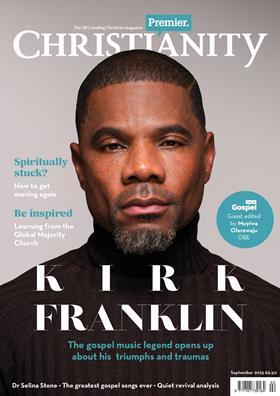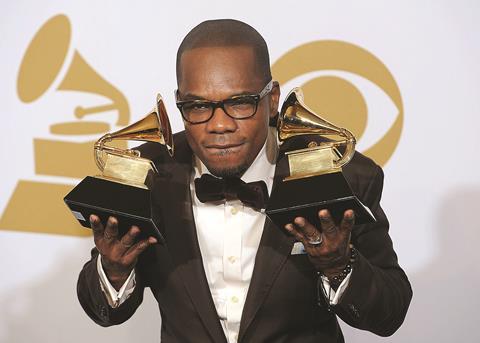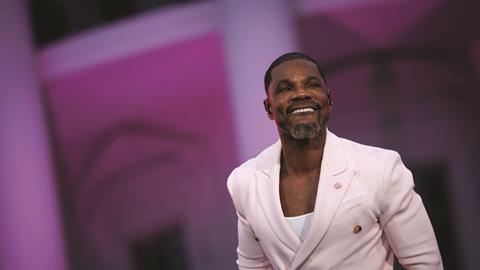He’s been scrutinised as intensely as he’s been celebrated but for Kirk Franklin, however painful, the criticism comes with the calling. The 20-time Grammy winner opens up about the toll of ministry, the traumas he’s still healing from and why his faith feels truer than ever
If you’ve sung ‘Stomp’ at youth camp, wept to ‘Imagine me’ or found yourself grinning while listening to ‘I smile’ on the school run, you already know why Kirk Franklin is on the cover this month. For more than 30 years, Franklin has been remixing the sound of the Church for the streets, and the sound of the streets for the Church – pairing the thunder of a gospel choir with the snap of hip hop and the polish of R&B. He’s known worldwide not for his silky singing voice but for the way he commands a record – conducting, testifying, producing, preaching. It’s a style felt every Sunday in churches across the globe.
By any measure, Franklin is gospel music’s standard-bearer. He’s a 20-time Grammy winner – making him the most successful gospel artist in history and second only to a small number of mainstream stars (He’s won more titles than Coldplay and The Beatles put together). This year, the Recording Academy’s Black Music Collective honoured him as a Black Music Icon. With more than 15 million albums sold across choir projects and solo releases, his reach is extraordinary for music that never lets go of Jesus. Variety once called him “the reigning king of urban gospel”.
UK audiences know his impact first-hand. His concerts here sell out, including last summer’s appearance at the OVO Arena Wembley with Maverick City – a night that felt more like a revival than a gig, with 12,000 worshippers singing along.
So, what sets him apart? Franklin is the choir director as frontman: part emcee, part pastor. He writes for voices, shapes grooves and leads call-and-response like a sanctified hype man. His sound – gospel confession with hip hop energy – has produced anthems our children and grandparents can sing together.
But this longevity hasn’t come without cost. In our conversation, Franklin speaks openly about his time in therapy. Success, he admits, can awaken old wounds, and caring for mind, body and spirit is part of his discipleship. He also names a pressure many in gospel quietly feel: the constant scrutiny of one’s “spiritual integrity”.
In March 2021, Franklin’s estranged son, Kerrion, released a secretly recorded phone call where Franklin was heard using profane language. Franklin apologised publicly and has been working privately to repair the relationship. “I was very ashamed of myself…I owned that,” he said.
Sometimes Franklin pushes the edge; sometimes the camera catches him off-guard. In 2024, a clip from Jamaica – tank top, outdoor heat, high-energy dancing – and a playful on-stage moment with a Clark Sister drew criticism. He responded by posting a heartfelt video apologising for moments where he’d been a distraction.
It wasn’t the first time Franklin has been criticised for his dancing. But whatever you think of the moves, he’s quick to listen, learn and own his missteps – a trait I’ve witnessed over more than 20 years of knowing him.
Franklin was adopted at four and didn’t find his biological father until the age of 53. It’s a journey still unfolding, and it adds depth to the man behind the music. Vulnerability sits right beside his accolades.
Franklin is pastoral yet playful, fierce about holiness yet free from the anxiety of performance. He describes church as a “hospital, not a country club”, and speaks about guarding joy from self-sabotage. At heart, he’s still the boy at the worn-out piano, praising Jesus – except now, he’s inviting the world to sing along.
Kirk Franklin isn’t just gospel’s most decorated artist. He’s a mirror and a map for the Church in public: joyful, creative and always coming back to grace. The hits will catch your ear. His honesty might catch your heart. And the choir – well, the choir will lift the roof.

You’ve said before that you’ve been in therapy since your early 20s and still go twice a month. What are you working on right now, and how is it shaping your leadership?
There is this constant state of [wondering]: Am I ‘gospel’ enough for the community? [Am I] spiritual enough? You know, my spiritual integrity has been questioned my whole entire career. From ‘Stomp’ onwards, there have been questions about my heart before the Lord, which has always been hard for me because my love for Jesus and my love for his Church – my love for his people – is paramount in everything that I do.
Am I a wild boy? Yeah. Am I someone who likes to have fun? Yes. Do I like to dance and be celebratory about my love for Jesus? Yes. Was I raised on gospel music? No, I was raised on hip hop. I was raised on urban music. Do I want gospel music to have the best sound and production and sonics and visuals? I’m representing the creator of the universe – of course I do! Have you ever looked at the stars in the sky? That’s one of the most beautiful productions that can ever be put together. Why would I, as a son, not want to represent my Father in the same way?
What I do for ministry and for a living brings a certain level of trauma. But then, over the last five years, Covid brought a level of trauma into my life. The issue with my son brought a certain level of trauma in my life. Finding out that the man who I thought was my biological father wasn’t my biological father, and then having to re-engage with a mother who abandoned me – those have all been traumas. It doesn’t stop.

You once likened your ministry to wearing “golden handcuffs”. What did you mean by that?
Most Christians are not weighed down by their faith also being intertwined with their occupation. They’re able to be believers - and go through what believers go through - without being put under the microscope or having a spotlight always focused on them as they’re trying to live out their Christianity.
But when Christianity is also your career, it comes with a lot of pressures and judgements. That can be challenging, because you “arebeing transformed into his image” [2 Corinthians 3:18, emphasis added], you are not fully in the image of Christ. Going through the sanctification process while on the stage can be challenging.
God is more concerned about us resting in his perfect work than performance
But I also understand that to whom much is given, much is required [Luke 12:48]. I do not ever want to come across like it’s a complaint, because I am honoured to serve the Lord, and honoured that the Lord will loan me songs and ideas that I can use to make the kingdom known on the earth.

When people say unkind things, it can be traumatic. So how do you put boundaries in? Do you stop yourself reading newspapers or comments online?
You try! You try not to read. But in your fallen nature you still stumble on a caption or something. I want to make sure the music and the message are connecting with people, speaking to people’s hearts. And then you’ll read something that’s not the most favourable: that you run around too much, you jump too much…And you know, I haven’t stopped jumping, I haven’t stopped dancing! But some things people say are hurtful. It’s painful, and you have to take it.
I’m a very sensitive man. I’m sensitive to the thoughts and views of people, because I want to do good and I want people to really feel what I say. I care deeply.
You’ve said before: “Western Christianity and the teachings of Jesus are not synonymous.”
Facts!
So what are some of the doctrines that you’ve had to let go of, and what are some that you’ve had to recover or reclaim?
I think that what Reformed theology, some would call it Calvinism, [has taught me is] that God is more concerned about us resting in his perfect work, which is grace, than the performance of: I’ve got to make sure I am right for God.
One example is, within our culture, we have often made people who are not married look like they are not usable by the kingdom unless they are married – because we’ve made marriage almost synonymous with salvation.
We have not done a good job of making single people believe and understand that they’re still usable in the kingdom. God wants to use you just as much if you’re single – or even more, if you’re listening to Paul! Paul said: “I wish that some of you were not married so that you could be fully committed like me” [see 1 Corinthians 7:7]. But we have made certain cultural norms prerequisites. It is not true. We’re saved by faith and grace alone.

You grew up in America and you’re a Westerner. But how has understanding your heritage and learning about the African fathers of the faith – Tertullian, Augustine, etc – affected your language of worship?
Historical truth has given so much more gravity to my Christian pilgrimage. My Christian sojourn has been enlightened and enhanced, over the last decade and a half, as a certain level of academia has contributed to my Christian experience. Unfortunately, Christianity in America has come with many vices that have not always allowed the true teachings of Jesus Christ to be free and to flow to the hearts and minds of believers. Christianity in America can be polarised, and its incestuous relationship with politics and government has historically been problematic for people of colour. It can be a great challenge.
Going through the sanctification process while on the stage can be challenging
The simple truth is that Europe did not influence Africa. Africa influenced Europe when it comes to the teachings and truths of the historical Jesus – three centuries before Constantine.
It’s not like music is just an emotional experience, because I’m a Black person who was taught the white man’s religion which came up on the boat, and now I am blind to the truth. No. There’s so much gravity and depth of understanding of the historical Jesus when I now sing about him. And this truth comes to life because the same gospel that was used to enslave us is now used to free us. No other people on the planet have that narrative when it comes to their journey. There is not one race of people that has that same experience.
Black people were taught a religion, and that religion was weaponised against us. Scriptures were flipped and certain chapters were taken out. Like when you hear about the slave Bible - certain books were torn out so that the slaves would not know about their freedom. No other group of humans on the planet have that story.
Quickfire
Finish this sentence: “I didn’t want my kids to see Jesus as the guy who kept Dad away. So I…”
…worked hard to make sure that there’s enough balance and that when I was not present, their feelings were able to be heard and processed, so that they saw me as a partner and not a nemesis of their faith.
What are you protecting your joy from?
Myself!
A belief you’ve publicly repented of that’s unlocked fresh creativity in you.
That God hates me, that I have to perform for his acceptance.
One prayer you pray for your enemies.
For God to give me the real time experience of forgiving them and letting go, because keeping hold of it is pride. Scripture says, “Vengeance is mine…says the Lord” (Romans 12:19, ESV).
A lyric you wish you could rewrite.
Not one.
What would make you content to hang up the mic tomorrow?
Taking my last breath on this side of heaven.
What young artists are you intentionally stepping aside for?
Chandler [Moore] is one of my favourite ones. But I’m open to opening any door for anyone who ever wants my help. I’m always trying to be a conduit in any way that I can.
To hear the full interview listen to Premier Christian Radio at 8pm on Saturday 13 September or download The Profile podcast







































No comments yet